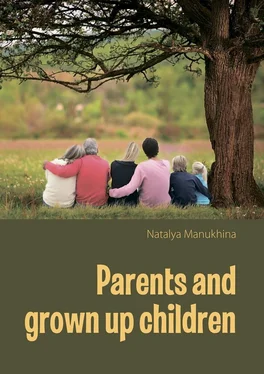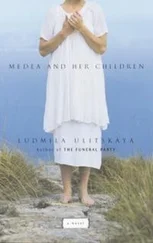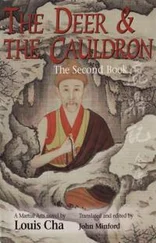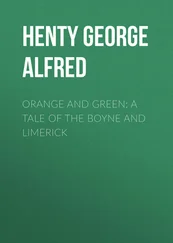Natalia Manukhina - Parents and grown up children
Здесь есть возможность читать онлайн «Natalia Manukhina - Parents and grown up children» — ознакомительный отрывок электронной книги совершенно бесплатно, а после прочтения отрывка купить полную версию. В некоторых случаях можно слушать аудио, скачать через торрент в формате fb2 и присутствует краткое содержание. ISBN: , Жанр: psy_generic, Домоводство, foreign_language, на английском языке. Описание произведения, (предисловие) а так же отзывы посетителей доступны на портале библиотеки ЛибКат.
- Название:Parents and grown up children
- Автор:
- Жанр:
- Год:неизвестен
- ISBN:9788381263979
- Рейтинг книги:4 / 5. Голосов: 1
-
Избранное:Добавить в избранное
- Отзывы:
-
Ваша оценка:
- 80
- 1
- 2
- 3
- 4
- 5
Parents and grown up children: краткое содержание, описание и аннотация
Предлагаем к чтению аннотацию, описание, краткое содержание или предисловие (зависит от того, что написал сам автор книги «Parents and grown up children»). Если вы не нашли необходимую информацию о книге — напишите в комментариях, мы постараемся отыскать её.
Parents and grown up children — читать онлайн ознакомительный отрывок
Ниже представлен текст книги, разбитый по страницам. Система сохранения места последней прочитанной страницы, позволяет с удобством читать онлайн бесплатно книгу «Parents and grown up children», без необходимости каждый раз заново искать на чём Вы остановились. Поставьте закладку, и сможете в любой момент перейти на страницу, на которой закончили чтение.
Интервал:
Закладка:
Parents and grown up children
Natalia Manukhina
© Natalia Manukhina, 2017
ISBN 978-83-8126-397-9
Created with Ridero smart publishing system
Preface
Dedicated to all of us, children of our parents
Introduction
…At the age of six my lifestyle as an active child was severely restricted due to heart problems caused by flu: I was no longer allowed to run, spring and jump, or scamper around the yard with other children. The limitations included skipping kindergarten and a “lifelong” exemption from physical education at school.
When I was nine Father, in spite of worries and fears of my mother, took me to swimming lessons. At the swimming pool “Moscow” (in whose place the Cathedral of Christ the Savior has been restored now) he saw an advertisement that read: “Boys and girls! If you want to become masters of sport come to the swimming instructor…” Father apparently wanted me to become a master of sport rather than an invalid, or maybe it was because he himself had learnt to swim from a teach yourself book at a mature age. Anyway, he took me to the instructor mentioned in the advertisement.
I must say that I was not doing very well. If I went swimming for two weeks, I had to stay in bed during the next four weeks. One foggy day as I was swimming in the lane (of an outdoor pool) I heard the instructor say to his assistant: “She misses more lessons than she attends. Nothing will come of her. And she yells! Her shouts make me deaf!” The assistant answered: “The girl is doing her best. She often falls ill, but she still comes to lessons. Let her train. If she can’t, she will clear out herself.” Suddenly I realized that they were speaking about me! It was me who missed the lessons, and who yelled (I could not see the instructors in a fog), it was me whom they wanted to expel. My God! It was me, who was so eager to learn to swim!
I started to disobey doctors’ orders: as soon as the temperature went down I would hurry to the swimming pool. I could miss lessons at school, but not swimming lessons. Not at any price!
As a result I “did not clear out”, but quite the contrary – at the age of eleven I became a master of sport, at 12 I was the champion of the USSR and at 14 participated in the European Championship. Everyone was surprised that “the twelve-year-old Natasha Kabanova (it is my maiden name) beat the famous Devjatova in the 200-meter butterfly!” By the way, fifteen out of the twenty members of our team became masters of sport. More than once the winners occupying all the pedestal of Moscow and USSR championships or even the top five were our team members. So we really had a first-class instructor!
All the members of the USSR national team regularly underwent a medical examination, which revealed that my heart functioned properly. Since then I have been aware that one can manage and regulate his or her own health, although it needs a lot of time and energy. Thus, I can say that my father saved my life by taking me to swimming lessons…
However, professional sports require enormous efforts. We had trainings every day all the year round plus team practice sessions, which left us too little free time.
I went to the European Championship alone. It was 1970 and because of the notorious “Section 5” they did not let my instructor (who indicated his nationality as “Jewish”) go abroad. I found myself in a foreign country. We lived out of town, 25 kilometers from the swimming pool, where they took sportsmen only on competition days. Others trained themselves as they could following the plan drawn up in advance by their instructors. I did not have such plan and did not know how to make it. Consequently, I came seventh in Europe, finishing on the same place as I had occupied before, while I was determined to win…
That was a good lesson for me: it turned out that my records were the result of the work done by my instructor rather than my own achievements. Maybe this is the reason why in my profession helping people I always try to teach them how to cope with their tasks on their own. I am very glad that families need minimal professional help in order to develop in a new way. Maybe this is why in my psychotherapeutic, consultative and instructional practice I try to encourage people to pass to coaching at once or step by step. In the process of coaching a client does not only get assistance in fulfillment of a particular task, but gains an experience of overcoming difficulties by oneself.
Father was very proud of my sports achievements. He was glad that I was healthy and never spoke to me about the future, especially as I regularly received “fours” without making an effort. In the tenth form I found out that some of my classmates had been attending preparatory courses at different institutes since last year, while I had not even heard about such courses. Everybody expected me to make a career in sports and like all sportsmen end up as an instructor when I would be too old for my own records. However, I thought that I had an “instructor with a God-given talent” just as well as good school teachers have a special talent to teach. Perhaps that is why I could not at once find the courage and it took me so long to master my present profession of a teacher, instructor, coach and consultant… When my elder sister learnt that I was not going to enter the Institute of Sport she found me a private tutor to help me become a student of the Technical University, which she had graduated by that time. So I enrolled at that university.
When I met other students I suddenly realized that unlike the girls of my age I was not able to choose feminine clothes that would suit me, to do my hair, to put on make-up, could not flirt and easily get on with my peers, or, as they say now, hang out with them. My father had taught me in his own way: “Don’t swing your hips so that bad men don’t molest you. Don’t spoil your skin with make-up. Don’t show your emotions. If you undertake a task, carry it to completion…” My dedication was enviable. There was also too much toughness, inflexibility or as psychologists call it rigidness in me: if I decided to do something or set a goal nothing could stop me. Resolution and selflessness were men’s qualities implanted in me by my father who, having two daughters, was longing for a son…
Now, when I have worked so much on my own feminine identity, I often help others in my practice to decide how long and to what extent they should meet their parents’ expectations; what to do when their lives take the turn that could not have predicted by their parents.
When my first child was born my father said: “I didn’t think you would make such a good mother”. He could not believe that I had finally fulfilled myself as a woman. This change in me made our relations very different. Maybe it happened because now he was a grandfather and had a new role. Indeed, with his grandchildren he was a different man – he let them love openly, without restrictions and conditions, not demanding from them to follow his own strict rules.
Father died at the age of 65 after a difficult operation. It was the Easter Sunday. The next day he was to be discharged from the hospital. His last words were “I don’t want to die! I want to love my grandchildren, play with them!” Well, he spent all his life doing his duties, coping with difficulties and protecting us from troubles, so he had no time to play around and show his love… My father’s death was a terrible blow for his family. Only after we had lost him did we realize how important he had been for us. We found it too hard to live and work as we did before. It was even painful for us to communicate with one another. Only after a few decades were we able to recall and discuss the past, when Father was with us. I still miss him. Perhaps this is the reason why I continue following some of his instructions and prohibitions, which today seem quite old-fashioned. For example, I do not drive while my sister and my children are excellent drivers. My six-year grandson can sing, dance, type freely and play computer games without having ever studied all that, except from his parents. He asks me such questions and answers my questions in such a way that I begin to doubt that he learnt systemic thinking in his mother’s womb. Or, maybe the whole generation is like that…
Читать дальшеИнтервал:
Закладка:
Похожие книги на «Parents and grown up children»
Представляем Вашему вниманию похожие книги на «Parents and grown up children» списком для выбора. Мы отобрали схожую по названию и смыслу литературу в надежде предоставить читателям больше вариантов отыскать новые, интересные, ещё непрочитанные произведения.
Обсуждение, отзывы о книге «Parents and grown up children» и просто собственные мнения читателей. Оставьте ваши комментарии, напишите, что Вы думаете о произведении, его смысле или главных героях. Укажите что конкретно понравилось, а что нет, и почему Вы так считаете.











